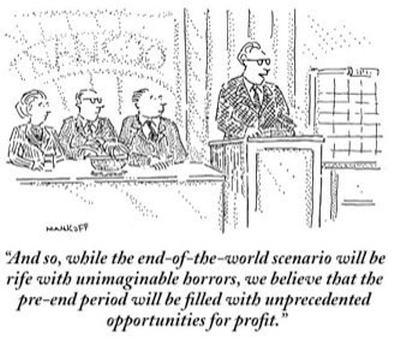What’s unfettered in America is “Communism for the Rich” and the normalization of corruption that results from the auctioning of political power to protect monopolies and cartels. The irony of constantly being accused of being a communist is rather rich. When I point out that “free market capitalism” in America is neither a real market nor real capitalism, those who equate any criticism of “capitalism” as proof of communist leanings are triggered. Noting that Marx got monopoly capitalism and alienation right triggers another group who equate any favorable mention of Marx as proof of communist leanings. There are two ironies in these accusations of being a communist. One is that I’ve spent 17 years tirelessly critiquing centralized wealth and power–the acme of
Topics:
Charles Hugh Smith considers the following as important: 5.) Charles Hugh Smith, 5) Global Macro, Featured, newsletter
This could be interesting, too:
Nachrichten Ticker - www.finanzen.ch writes Die Performance der Kryptowährungen in KW 9: Das hat sich bei Bitcoin, Ether & Co. getan
Nachrichten Ticker - www.finanzen.ch writes Wer verbirgt sich hinter der Ethereum-Technologie?
Martin Hartmann writes Eine Analyse nach den Lehren von Milton Friedman
Marc Chandler writes March 2025 Monthly
 What’s unfettered in America is “Communism for the Rich” and the normalization of corruption that results from the auctioning of political power to protect monopolies and cartels.
What’s unfettered in America is “Communism for the Rich” and the normalization of corruption that results from the auctioning of political power to protect monopolies and cartels.
The irony of constantly being accused of being a communist is rather rich. When I point out that “free market capitalism” in America is neither a real market nor real capitalism, those who equate any criticism of “capitalism” as proof of communist leanings are triggered.
Noting that Marx got monopoly capitalism and alienation right triggers another group who equate any favorable mention of Marx as proof of communist leanings.
There are two ironies in these accusations of being a communist. One is that I’ve spent 17 years tirelessly critiquing centralized wealth and power–the acme of communism–as the source of our moral, social and economic decay.
The other irony is that Communism is absolutely thriving in America in broad daylight: the monopolies, quasi-monopolies and cartels that dominate the American economy and governance are Communism for the Rich.
The core goals and functions of communism and monopolies/cartels are identical: snuff out unfettered markets (competition, transparent price information for all participants, etc.) and take control of all market functions, restricting supply and controlling all regulation with the sole goals of further concentrating centralized power and maximizing steady profits (i.e. maximum greed) to benefit those who own/control the concentrated wealth and power.
And of course both pump out an endless spew of propaganda about the wonderfulness of the system that benefits the few at the expense of the many.
This centralized power to benefit the few at the expense of the many characterizes both Communism and monopolies / cartels. There is no difference between the two other than the structures of control that eliminate competitors, regulates supply and keeps prices high enough to further enrich the already-rich.
Those operating monopolies and cartels in America are in effect a private-public Politburo, a concentration of wealth that buys whatever political power is needed to increase profits and protect the monopoly from threats.
What’s unfettered in America is Communism for the Rich and the normalization of corruptionthat results from the auctioning of political power to protect monopolies and cartels. “Markets” and “capitalism” only exist on the fringes of the economy, but the myth that America is the home of “unfettered capitalism” is extremely useful cover for the actual system, which is Communism for the Rich.
Tags: Featured,newsletter
